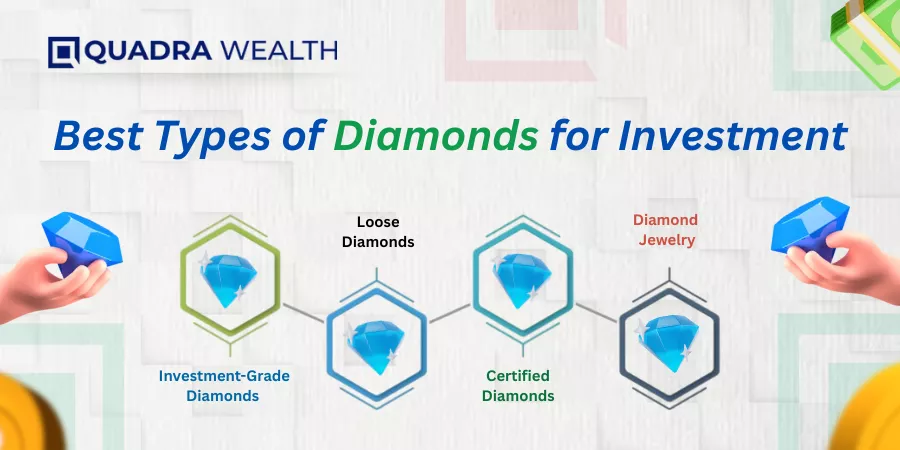Are you wondering whether diamonds are a good investment? Investing in diamonds is about more than just their beauty and sparkle. Traditionally, people used to wear diamond jewelry as a luxury item and a status symbol.
With the increasing demand for diamonds over time, some investors now consider them a hedge investment. But is investing in diamonds good for your investment portfolio? Unlike bonds or stocks, diamonds have inherent value but also carry some uncertainties.
This guide will help you learn about “are diamonds a good investment?” We will explore the best types of diamonds for investment and the potential pros and cons of investing in diamonds.
What is Meant by Diamond Investment?
Diamond investment means buying diamond jewelry with intention of earning profits on them. For centuries, people have bought diamonds as a symbol of prestige. However, things have changed. Today, people buy diamonds for their diversified investment portfolio.
While they were once considered luxury items intended for special occasions, many investors consider them a smart investment opportunity. Just like other investments such as real estate and gold, their buying and selling is expected to gain more value over time.
The evolving market for diamond investing mirrors this transformation. And it is primarily triggered by an increasing demand and a renewed interest in alternative investments and emerging economies. However, potential investors must evaluate the associated risks and rewards before taking a decision.
Are Diamonds Worth Investing In?
Understanding the complexities of the diamond market such as demand, supply, and ethical sourcing is crucial for making an informed decision.
The diamond market operates based on unique patterns, mainly influenced by supply and demand, and ethical considerations. It is also affected by appreciation, especially in relation to the sourcing of lab-grown versus natural diamonds.
According to recent statistics, the global diamond market valued at over $100 billion is expected to exceed $140 billion by 2029.
Factors such as scarcity of natural diamonds and growing consumer interest in ethically sourced gems are driving demand. Lab-grown diamonds have also evolved as a practical substitute.
However, their price is comparatively lower than their natural counterparts, which can influence overall market dynamics. So, industry experts opine that buying diamonds as an investment may not be wise for everyone.
Best Types of Diamonds for Investment

There are many ways to invest in diamonds, from certified diamonds and high-end jewelry to investment-grade stones and loose diamonds. Investment-grade gems and loose diamonds are often the best investment option, as they tend to hold a high resale value. While diamond jewelry features an investment you can wear and admire their brilliance at the same time.
The most typical categories of diamonds are as follows:
Investment-Grade Diamonds
Investment-grade diamonds are high quality gems that reflect excellent grading, highly valued.
Loose Diamonds
Loose diamonds are unset gems that are particularly purchased for investment purposes.
Certified Diamonds
Certified diamonds are certainly good to buy as they can deliver valuable rewards on resale.
Diamond Jewelry
Purchasing a fine jewelry diamond enables you to wear the item, realizing that it will rise in value.
Recently, lab-grown diamonds have won recognition as a substitute to natural gems. Though they are generally less precious stones than natural diamonds, lab-grown diamonds are gaining popularity among investors seeking a more cost-effective and ethical alternative.
How to Invest in Diamonds Wisely?
Before you decide to purchase diamonds, it’s essential to consider the diamond market trends that impact gemstones’ long-term significance.
Here’s a rundown of factors that play a key role in deciding for diamond investment:
Certification
Rest assured that any diamond you buy holds a certification from a renowned institution such as the Gemological Institute of America.
The 4Cs
Understanding the 4Cs – clarity, cut, color, and carat weight is crucial for analyzing a diamond’s value and quality.
Ethical Sourcing
With increasing consumer awareness of ethical sourcing, investors should focus on buying ethically sourced diamonds for long-term value.
Market Timing
Staying ahead of market trends can help investors make well-informed choices about when to purchase or sell their precious stones.
Selecting certified diamonds from reliable sources not only helps in eco-friendly mining but also retains the diamond’s value in today’s impact-driven market.
Pros and Cons of Investing in Diamonds
Like any investment, diamonds have their pros and cons. On a positive note, diamonds are compact and lightweight, making them a convenient resource. They are also scarce, and some top-notch diamonds may appreciate over time, particularly in niche markets. These are key factors to decide for buying diamond pendants as an alternative asset.
Experts often consider diamonds to be inflation-resistant, as their value is expected to grow with inflation.
However, challenges are there: diamond prices can fluctuate, and the market isn’t as liquid as traditional assets. It means that selling a diamond at its expected price could require patience. Assessing a diamond’s true value also requires expertise which can be challenging for new investors.
Diamonds investment may be a lucrative undertaking if approached wisely and researched. Diamonds are not a liquid asset, but the right knowledge and direction can contribute to diamond’s resale value.
If you are trying to understand “are diamonds a good investment?”, seeking advice from an expert is recommended. They can provide you with valuable industry insights helpful to make wise financial decisions.
External Factors that Affect Diamonds Value

Do you want to pursue diamond investment? Taking into account the following factors along with some basic research can help you witness diamond market trends and make conscious decisions.
Limited Supply
Natural diamonds have a finite supply which can influence their purchase and trade. New diamond mines are rarely discovered and their manufacturing is managed carefully to avoid oversupply in the diamond market.
Moreover, the diamond industry poured considerable investment into market campaigns that added to longing for diamond engagement rings. For example, the DeBeer’s campaign advertising engagement rings in the 1930’s.
Market Fluctuations
While diamonds have inherent value that can appreciate over time, their resale value can be more volatile in contrast to other investments like bullion, stocks, or real estate. There can be fluctuations in diamond prices depending on interest rates, trends in fashion, market demand, and geological and economic conditions.
Persons must decide diamond investment for long term individual financial goals than striving for short term gains. Chances are, diamonds would increase in value over time with a long term investment option.
Also, the diamond market is generally more stable for long term investors than diamonds intended for potential short term investment. Overall, you have to keep in mind that diamond prices are prone to fluctuate based on the market.
The liquidity of selling diamonds can be more intricate than selling other investments. If you purchase diamonds at a retail price, a markup is included for overhead expenses and dealer’s profit margins. It could also influence the possibility of making a profit as an investment. It can also be challenging to find the purchaser willing to pay the desired price.
Final Thoughts
Diamond investment offers both tangible and intangible benefits. Beyond the elegance and sentimental value of diamond jewelry, it has the likelihood of increasing in value over time. If you want to invest in diamonds as part of a diversified portfolio, you should choose diamonds with high quality cut, clarity, color, and carat weight.
Finally, whether buying diamond jewelry is a good investment focuses on your personal financial goals, risk tolerance, and preferences. What is valuable and precious for one person may not have the same value for the other. This situation makes it hard to anticipate how much return on investment one can get.
Consulting our guide on ‘Are diamonds a good investment?’ will help you buy your rarer diamonds for personal and potential investing reasons.
Quadrawealth experts are always at your service to help you make the right decision!
FAQs
Q1. Do Diamonds Appreciate in Value?
A: Yes, some diamonds can increase in value over time, especially high quality and rare diamonds such as flawless and vividly colored gemstones.
Q2. Do Diamonds Sustain their Value?
A: Generally, diamonds retain their value over time, specifically rare, high quality gems, which can even appreciate. However, diamond’s resale value is uncertain. Unique, top quality diamonds commonly maintain the most value.
Q3. Are Colored Diamonds Considered a Goods Investment?
A: In the past, color diamonds were considered extremely rare items which only the most rich and affluent families could buy. However, with time, together with advancement in the internet platforms, luxury color diamonds slowly began to catch diamond enthusiasts’ attraction.






